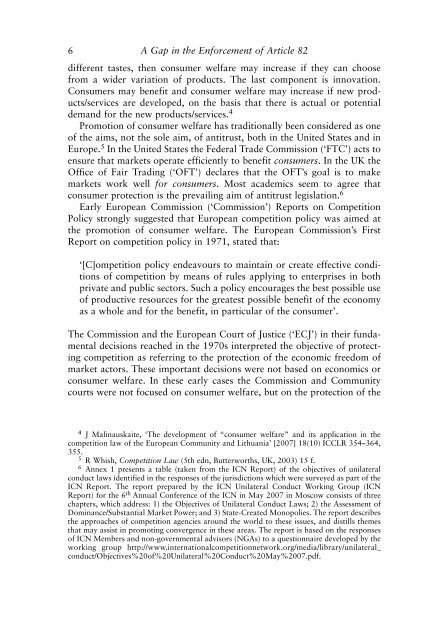Abuse of Economic Dependence - The Centre for European Policy ...
Abuse of Economic Dependence - The Centre for European Policy ...
Abuse of Economic Dependence - The Centre for European Policy ...
Create successful ePaper yourself
Turn your PDF publications into a flip-book with our unique Google optimized e-Paper software.
6 A Gap in the En<strong>for</strong>cement <strong>of</strong> Article 82<br />
different tastes, then consumer welfare may increase if they can choose<br />
from a wider variation <strong>of</strong> products. <strong>The</strong> last component is innovation.<br />
Consumers may benefit and consumer welfare may increase if new products/services<br />
are developed, on the basis that there is actual or potential<br />
demand <strong>for</strong> the new products/services. 4<br />
Promotion <strong>of</strong> consumer welfare has traditionally been considered as one<br />
<strong>of</strong> the aims, not the sole aim, <strong>of</strong> antitrust, both in the United States and in<br />
Europe. 5 In the United States the Federal Trade Commission (‘FTC’) acts to<br />
ensure that markets operate efficiently to benefit consumers. In the UK the<br />
Office <strong>of</strong> Fair Trading (‘OFT’) declares that the OFT’s goal is to make<br />
markets work well <strong>for</strong> consumers. Most academics seem to agree that<br />
consumer protection is the prevailing aim <strong>of</strong> antitrust legislation. 6<br />
Early <strong>European</strong> Commission (‘Commission’) Reports on Competition<br />
<strong>Policy</strong> strongly suggested that <strong>European</strong> competition policy was aimed at<br />
the promotion <strong>of</strong> consumer welfare. <strong>The</strong> <strong>European</strong> Commission’s First<br />
Report on competition policy in 1971, stated that:<br />
‘[C]ompetition policy endeavours to maintain or create effective conditions<br />
<strong>of</strong> competition by means <strong>of</strong> rules applying to enterprises in both<br />
private and public sectors. Such a policy encourages the best possible use<br />
<strong>of</strong> productive resources <strong>for</strong> the greatest possible benefit <strong>of</strong> the economy<br />
as a whole and <strong>for</strong> the benefit, in particular <strong>of</strong> the consumer’.<br />
<strong>The</strong> Commission and the <strong>European</strong> Court <strong>of</strong> Justice (‘ECJ’) in their fundamental<br />
decisions reached in the 1970s interpreted the objective <strong>of</strong> protecting<br />
competition as referring to the protection <strong>of</strong> the economic freedom <strong>of</strong><br />
market actors. <strong>The</strong>se important decisions were not based on economics or<br />
consumer welfare. In these early cases the Commission and Community<br />
courts were not focused on consumer welfare, but on the protection <strong>of</strong> the<br />
4 J Malinauskaite, ‘<strong>The</strong> development <strong>of</strong> “consumer welfare” and its application in the<br />
competition law <strong>of</strong> the <strong>European</strong> Community and Lithuania’ [2007] 18(10) ICCLR 354–364,<br />
355.<br />
5 R Whish, Competition Law (5th edn, Butterworths, UK, 2003) 15 f.<br />
6 Annex 1 presents a table (taken from the ICN Report) <strong>of</strong> the objectives <strong>of</strong> unilateral<br />
conduct laws identified in the responses <strong>of</strong> the jurisdictions which were surveyed as part <strong>of</strong> the<br />
ICN Report. <strong>The</strong> report prepared by the ICN Unilateral Conduct Working Group (ICN<br />
Report) <strong>for</strong> the 6 th Annual Conference <strong>of</strong> the ICN in May 2007 in Moscow consists <strong>of</strong> three<br />
chapters, which address: 1) the Objectives <strong>of</strong> Unilateral Conduct Laws; 2) the Assessment <strong>of</strong><br />
Dominance/Substantial Market Power; and 3) State-Created Monopolies. <strong>The</strong> report describes<br />
the approaches <strong>of</strong> competition agencies around the world to these issues, and distills themes<br />
that may assist in promoting convergence in these areas. <strong>The</strong> report is based on the responses<br />
<strong>of</strong> ICN Members and non-governmental advisors (NGAs) to a questionnaire developed by the<br />
working group http://www.internationalcompetitionnetwork.org/media/library/unilateral_<br />
conduct/Objectives%20<strong>of</strong>%20Unilateral%20Conduct%20May%2007.pdf.


